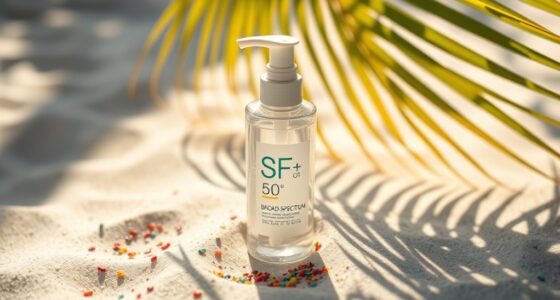Your gut health directly shapes your skin. Both systems are interconnected, hosting billions of microbes that influence each other. If your gut’s out of balance, it can lead to skin issues like acne, eczema, and psoriasis. Diet plays a crucial role; a nutrient-rich, fiber-filled diet promotes gut and skin health, while sugar and fat can worsen problems. Stress, sleep, and hydration also impact both. Discover how tuning your gut can lead to a radiant complexion ahead.
Key Takeaways
- The gut and skin are interconnected, with gut health directly influencing skin conditions through immune responses and microbial balance.
- Diet plays a crucial role; high sugar and fat intake can worsen skin issues, while a Mediterranean diet promotes gut and skin health.
- Inflammation from gut dysbiosis is linked to skin conditions like acne, eczema, and rosacea, highlighting the importance of gut health for clear skin.
- Lifestyle factors such as stress, sleep quality, hydration, and exercise significantly impact both gut balance and skin health.
- Probiotics and prebiotics are emerging as effective treatments, enhancing gut health to potentially improve various skin conditions.

When you think about skin health, you mightn’t consider your gut as a key player, but the connection between these two systems is profound. Your gut and skin are both expansive surfaces of your body, each covering about 25-30 square meters and hosting billions of microbes. They play crucial roles in your immune response, and changes in one can significantly impact the other, revealing a fascinating gut-skin axis.
The health of your gut microbiome directly influences your skin. Gut microbes produce metabolites that can alleviate inflammation, reducing skin conditions like acne and psoriasis. If you’re dealing with breakouts, you might want to consider that inflammation and an imbalance in your gut microbiome could be exacerbating your issues. Dysbiosis may contribute to the severity of autoimmune skin diseases, highlighting the importance of a balanced gut for clear skin. A diet rich in baked kale can provide beneficial nutrients that support both gut and skin health, including high antioxidants which may aid in detoxification. Additionally, switching to a raw food diet can enhance nutrient retention and improve overall health.
Eczema and rosacea are also tied to gut health; when your gut’s not functioning well, it can lead to flare-ups of these conditions, causing dry, itchy skin or redness and swelling.
What you eat plays a vital role in both gut and skin health. Diets high in sugar and fat can lead to imbalances that worsen skin conditions. On the flip side, a Mediterranean diet rich in fiber can lower the severity of issues like psoriasis. Incorporating fermented foods is a smart choice too; they help reduce inflammation and enhance the diversity of your gut microbiome.
Prebiotics and probiotics can further support gut health and may improve your skin. Remember, whole foods and fiber are essential for maintaining a balanced gut and, consequently, healthy skin.
Lifestyle factors also come into play. Stress can disrupt your gut balance, leading to skin flare-ups. If you’re not getting enough sleep, that can affect your gut health, which in turn affects your skin. Staying hydrated is crucial; it benefits both your gut and skin by reducing inflammation.
Regular exercise can support a healthy microbiome, while environmental stressors like pollution can negatively impact both.
Emerging therapeutic approaches focus on enhancing gut health to improve skin conditions. Probiotics and prebiotics are becoming popular for managing skin issues, as they help maintain a balanced microbiome.
As research continues to evolve, it’s becoming clear that the path to glowing skin may very well begin in your gut. So, if you’re seeking that gut glow, it’s time to pay attention to both your diet and lifestyle, nurturing your gut to reap the rewards for your skin.
Frequently Asked Questions
Can Stress Affect My Gut Health and Skin Appearance?
Yes, stress can significantly affect your gut health and skin appearance.
When you’re stressed, your body releases cortisol, disrupting your gut microbiome and increasing inflammation. This can lead to issues like “leaky gut,” allowing toxins into your bloodstream, which may trigger skin flare-ups.
Additionally, stress can imbalance hormones, worsening conditions like acne and eczema.
Managing stress through mindfulness, exercise, and a balanced diet can improve both your gut and skin health.
What Foods Should I Avoid for Better Skin?
Imagine your skin as a canvas, and what you eat as the paint. To achieve a clear complexion, you should avoid processed foods like fried items, refined carbs, and sugary snacks.
These can cause inflammation and dullness, much like a smudged painting. Also steer clear of high-fat dairy and charred meats, as they can trigger breakouts.
Instead, nourish your skin with whole foods for that vibrant, healthy glow you desire.
How Long Does It Take to See Skin Improvement?
You’ll typically start seeing skin improvements within a few weeks to a few months, depending on various factors.
If you focus on balancing your gut microbiome, reducing inflammation, and improving your diet, those changes can accelerate results.
Regularly incorporating probiotics, eating fiber-rich foods, and managing stress also play significant roles.
Are Probiotics Effective for Improving Skin Conditions?
Yes, probiotics can be effective for improving skin conditions. They help balance your gut microbiome, which may reduce inflammation and support skin health.
Strains like *Lactobacillus* have shown promise in treating issues like acne and eczema. While many people experience positive results, individual responses may vary.
It’s essential to choose quality products and consult with a healthcare professional for tailored advice on the best probiotic options for your skin concerns.
Can Hydration Levels Influence Gut Health and Skin Glow?
Absolutely, hydration levels significantly influence your gut health and skin glow.
When you stay properly hydrated, it enhances digestion, nutrient absorption, and toxin elimination, all of which are vital for healthy skin.
Plus, adequate hydration helps maintain a balanced gut microbiome, reducing inflammation that can lead to skin issues.
Conclusion
In conclusion, your gut health plays a crucial role in your skin’s appearance. Did you know that up to 70% of your immune system is housed in your gut? This means that what you eat can directly influence not just your digestion but also your complexion. By nurturing your microbiome with a balanced diet rich in probiotics and fiber, you can unlock that radiant “gut glow” and enjoy healthier, more vibrant skin. So, what are you waiting for?








